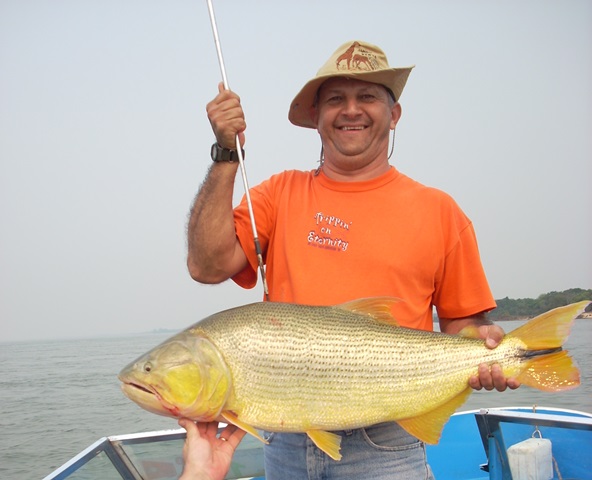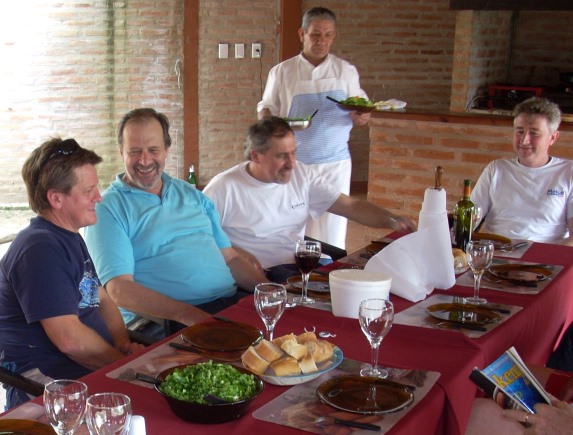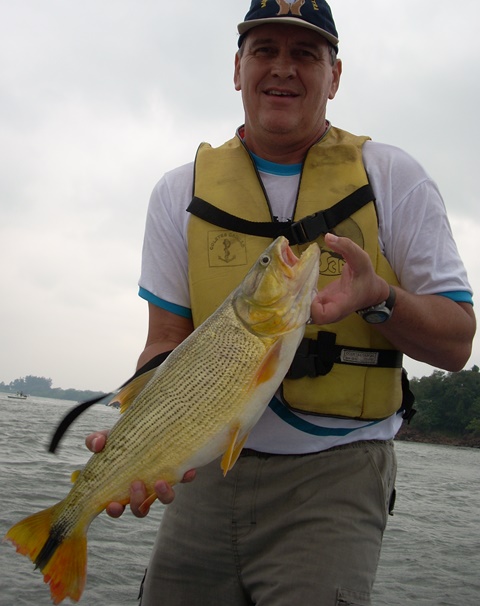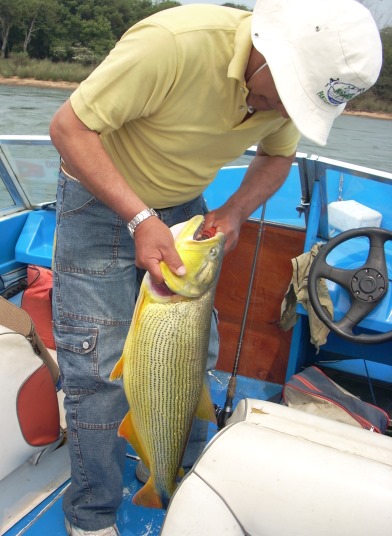El dorado
The rainbow trout is a beautiful fish, no doubt about it. But the most beautiful fish I’ve ever had on the end of my line is the South American Dorado.
As the name suggests, this guy is pure gold, like the famous lost city of El Dorado. Do you recall the legend from Junior High history class?
It originated with the Native Americans who endured the European conquest. I have always suspected they made up the story, like the legend of the Fountain of Youth, as a way to avenge their losses to the invaders.
At any rate, it seemed to work that way. Foreign soldiers-of-fortune from Diego de Ordaz and the Quesada brothers to Sir Walter Raleigh set out on futile expeditions to find the fabled Lost City of El Dorado. They found nothing of the sort, of course. They simply squandered wealth, health and lives on fruitless quests.
A curious character in the legend of El Dorado was its king. It was said that he had so much precious metal at his disposal that he powdered his body with gold dust before bathing. Imagine a real-live Golden Boy.

If you ever pull a South American dorado out of the water, you could believe that at least this part of the legend is true. The best description I could give you of salminus brasiliensis is a fish coated in gold dust. From gill to tail, this guy dazzles. He is so pretty that you feel a bit guilty when you land him, like you just robbed a jewelry store.
Not that I have landed that many dorado in my career. I can give you an exact count: two. And only one was a keeper. Nevertheless, the pair is enough to make me feel like an accomplished angler. I could die tomorrow with no regrets. I have caught the fabled fish.
The dorado does not live in the high Andes, but the rivers that form his habitat originate in these mountains. Bolivia’s Chapare and Mamoré rivers flow out of cloud forest to nurture dorado in the steamy jungles below. The Paraguay and Uruguay Rivers that define parts of Argentina’s northern border contain only a fraction of Andes runoff, yet offer some of the best dorado fishing on the continent.
My personal favorite for dorado fishing is the Paraná. Okay, it’s the only river I have ever successfully fished for dorado. Generous Argentine friends who own boats and proper tackle have taken me out several times on the stretches just below the Yacyretá dam. Dorado congregate there nowadays in quantity, impeded by the dam from migrating further upriver.

Oops! I let the cat out of the bag. Ah well, this spot is no secret. Thousands of fisher folk descend on this stretch of the Paraná from Brazil, Argentina and Paraguay, which lies on the opposite bank.
Fishing for dorado in the Paraná requires a good boat, sturdy gear and a knowledgeable guide. My Argentine friends generously supply it all at no charge. (No, I cannot give you their names and addresses.) It seems they want me to catch the fabled fish as much as I do.

My first time out was in a three-boat flotilla with a dozen Argentine friends. I caught my golden boy in the final hours of the second and last day. The five-pound, 20-inch specimen thrilled me. Onliest thing is, Argentine law stipulates 28 inches as the minimum size for a keeper.
Nevertheless, I proudly photographed myself with the fish while enduring the amused chuckles of my friends who smirked about “robbing the cradle” and so forth. Then in keeping with Argentine custom, I kissed the dorado and gently released him back into the Paraná.
Three years later I found myself trolling the same stretch of river with friends who wanted me to catch the fabled fish. None of us got so much as a nibble all morning. We were literally down to our last bait fish. Actually, it was only half a bait fish. My fellow fishermen insisted that I be the one to use it, even though the chances were slim to none that this pitiful prey would attract any interest.
As luck would have it, a fish struck, hard. Thanks to expert coaching, I eventually landed it and we found to our surprise that it was a respectable dorado. Okay, it measured 28.5 inches, just enough to be legal.  After slaps on the back and grinning accolades like, “We never once doubted you could do it!”, we took the fish home to photograph and stow in the cooler. I went to bed that night feeling like an accomplished angler.
After slaps on the back and grinning accolades like, “We never once doubted you could do it!”, we took the fish home to photograph and stow in the cooler. I went to bed that night feeling like an accomplished angler.
Every time I relive this accomplishment, I am reminded of the generosity of my Argentine friends. They provided literally everything: boat, pole, bait, time, lunch, advice, patience and landing net, just so I could achieve my 15 minutes of fame as a dorado fisherman. They even celebrated as if I had done something remarkable, like it was all me.
Their generous spirit contrasts sharply with fishermen I’ve heard about who like to keep things to themselves. For instance, one fellow organized an excursion to the fabled Lago Toro (see blog 3, Decent fishing). Once there, he refused to take the other fishermen out in his boat, the only water craft among the party. For two days, his companions glumly watched from shore as the boat owner dragged in one fat rainbow after another. Meanwhile their shoreline efforts produced zilch.
I’m told of another angler who followed guidelines set down by feudal overlords. He occasionally loaned a pole and spinner baits to fishing buddies, but with the stipulation that everything they caught with the gear belonged to him.
No, I’m not joking. Wish I were.
When Jesus called Simon, Andrew, James and John to leave their nets at Lake Galilee and become fishers of men, which class of fisherman do you think He expected them to become?
Well, He did give them some hints along the way.
“Give to every one who begs from you; and of him who takes away your goods do not ask for them again,” Luke 6:30. (Note: He doesn’t appear to be joking.)
“Give and it will be given to you. A good measure, pressed down, shaken together and running over, will be poured into your lap. For with the measure you use, it will be measured to you,” Luke 6:38. (Tip: Use this as a rule of thumb for calculating the parameters of your generosity.)
“If any one compels you to go one mile, go with him two,” Matthew 5.41. (Clarification: Jesus was talking about Roman soldiers here, but it also applies to stranded motorists.)
Finally, here’s one that I think that almost everybody has heard.
“Do to others as you would have them do to you,” Luke 6:31.
Wow, do you get that? Talk about simple, elegant and profound.
I would have to say that it’s the best rule ever for how to be generous.
In fact, it is absolutely golden.
Next time: In your own words

